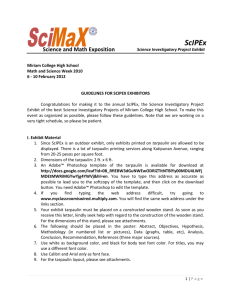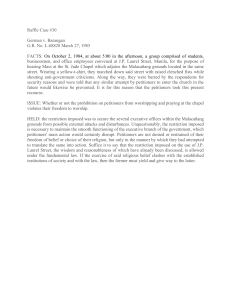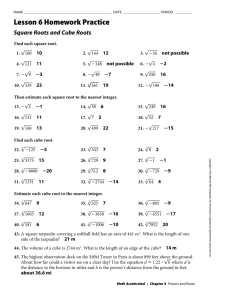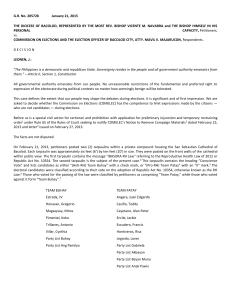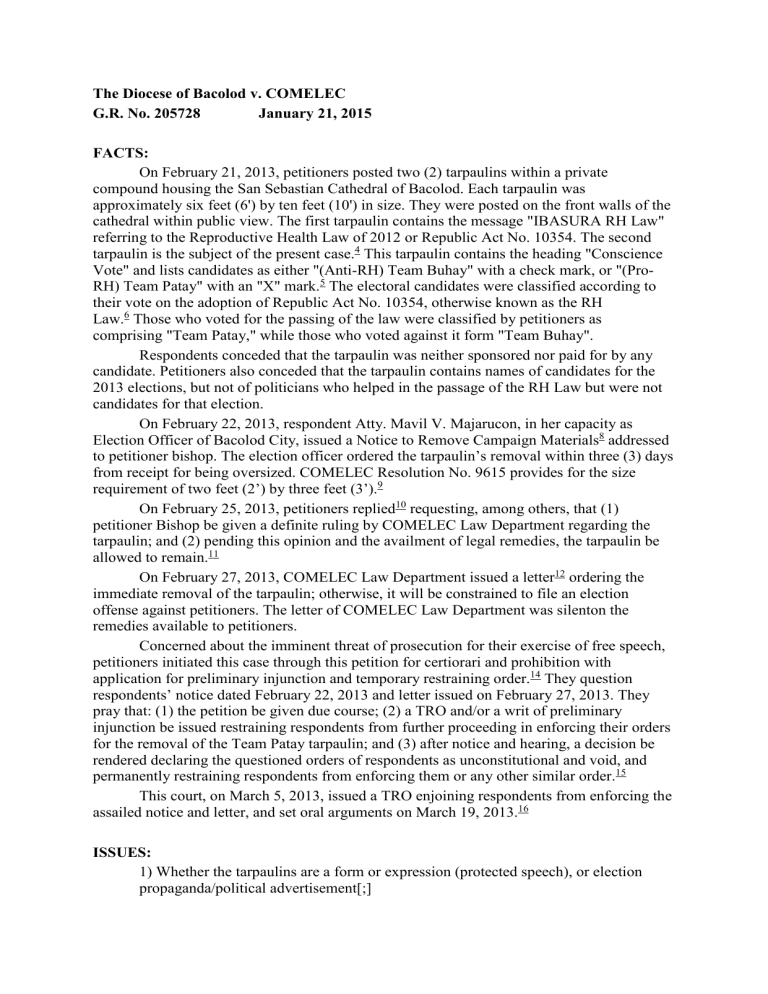
The Diocese of Bacolod v. COMELEC G.R. No. 205728 January 21, 2015 FACTS: On February 21, 2013, petitioners posted two (2) tarpaulins within a private compound housing the San Sebastian Cathedral of Bacolod. Each tarpaulin was approximately six feet (6') by ten feet (10') in size. They were posted on the front walls of the cathedral within public view. The first tarpaulin contains the message "IBASURA RH Law" referring to the Reproductive Health Law of 2012 or Republic Act No. 10354. The second tarpaulin is the subject of the present case.4 This tarpaulin contains the heading "Conscience Vote" and lists candidates as either "(Anti-RH) Team Buhay" with a check mark, or "(ProRH) Team Patay" with an "X" mark.5 The electoral candidates were classified according to their vote on the adoption of Republic Act No. 10354, otherwise known as the RH Law.6 Those who voted for the passing of the law were classified by petitioners as comprising "Team Patay," while those who voted against it form "Team Buhay". Respondents conceded that the tarpaulin was neither sponsored nor paid for by any candidate. Petitioners also conceded that the tarpaulin contains names of candidates for the 2013 elections, but not of politicians who helped in the passage of the RH Law but were not candidates for that election. On February 22, 2013, respondent Atty. Mavil V. Majarucon, in her capacity as Election Officer of Bacolod City, issued a Notice to Remove Campaign Materials8 addressed to petitioner bishop. The election officer ordered the tarpaulin’s removal within three (3) days from receipt for being oversized. COMELEC Resolution No. 9615 provides for the size requirement of two feet (2’) by three feet (3’).9 On February 25, 2013, petitioners replied10 requesting, among others, that (1) petitioner Bishop be given a definite ruling by COMELEC Law Department regarding the tarpaulin; and (2) pending this opinion and the availment of legal remedies, the tarpaulin be allowed to remain.11 On February 27, 2013, COMELEC Law Department issued a letter12 ordering the immediate removal of the tarpaulin; otherwise, it will be constrained to file an election offense against petitioners. The letter of COMELEC Law Department was silenton the remedies available to petitioners. Concerned about the imminent threat of prosecution for their exercise of free speech, petitioners initiated this case through this petition for certiorari and prohibition with application for preliminary injunction and temporary restraining order.14 They question respondents’ notice dated February 22, 2013 and letter issued on February 27, 2013. They pray that: (1) the petition be given due course; (2) a TRO and/or a writ of preliminary injunction be issued restraining respondents from further proceeding in enforcing their orders for the removal of the Team Patay tarpaulin; and (3) after notice and hearing, a decision be rendered declaring the questioned orders of respondents as unconstitutional and void, and permanently restraining respondents from enforcing them or any other similar order.15 This court, on March 5, 2013, issued a TRO enjoining respondents from enforcing the assailed notice and letter, and set oral arguments on March 19, 2013.16 ISSUES: 1) Whether the tarpaulins are a form or expression (protected speech), or election propaganda/political advertisement[;] A. Assuming arguendo that the tarpaulins are a form of expression, whether the Comelec possesses the authority to regulate the same[;] B. Whether this form of expression may be regulated[;] RULING: 1. We distinguish between political and commercial speech. Political speech refers to speech "both intended and received as a contribution to public deliberation about some issue," "foster[ing] informed and civicminded deliberation." On the other hand, commercial speech has been defined as speech that does "no more than propose a commercial transaction." The expression resulting from the content of the tarpaulin is, however, definitely political speech. In Justice Brion’s dissenting opinion, he discussed that "[t]he content of the tarpaulin, as well as the timing of its posting, makes it subject of the regulations in RA 9006 and Comelec Resolution No. 9615." He adds that "[w]hile indeed the RH issue, by itself,is not an electoralmatter, the slant that the petitioners gave the issue converted the non-election issue into a live election one hence, Team Buhay and Team Patay and the plea to support one and oppose the other." While the tarpaulin may influence the success or failure of the named candidates and political parties, this does not necessarily mean it is election propaganda. The tarpaulin was not paid for or posted "in return for consideration" by any candidate, political party, or partylist group. 1A. COMELEC had no legal basis to regulate expressions made by private citizens Respondents cite the Constitution, laws, and jurisprudence to support their position that they had the power to regulate the tarpaulin. However, all of these provisions pertain to candidates and political parties. Petitioners are not candidates. Neither do they belong to any political party. COMELEC does not have the authority to regulate the enjoyment of the preferred right to freedom of expression exercised by a non-candidate in this case. 1B. Every citizen’s expression with political consequences enjoys a high degree of protection. Respondents argue that the tarpaulin is election propaganda, being petitioners’ way of endorsing candidates who voted against the RH Law and rejecting those who voted for it. As such, it is subject to regulation by COMELEC under its constitutional mandate. On the other hand, petitioners invoke their "constitutional right to communicate their opinions, views and beliefs about issues and candidates." They argue that the tarpaulin was their statement of approval and appreciation of the named public officials’ act of voting against the RH Law, and their criticism toward those who voted in its favor. It was "part of their advocacy campaign against the RH Law," which was not paid for by any candidate or political party. Thus, "the questioned orders which . . . effectively restrain[ed] and curtail[ed] [their] freedom of expression should be declared unconstitutional and void." This court has held free speech and other intellectual freedoms as "highly ranked in our scheme of constitutional values." These rights enjoy precedence and primacy. In Philippine Blooming Mills, this court discussed the preferred position occupied by freedom of expression: Property and property rights can belost thru prescription; but human rights are imprescriptible. If human rights are extinguished by the passage of time, then the Bill of Rights is a useless attempt to limit the power of government and ceases to be an efficacious shield against the tyranny of officials, of majorities, ofthe influential and powerful, and of oligarchs - political, economic or otherwise. In the hierarchy of civil liberties, the rights of free expression and of assembly occupy a preferred position as they are essential to the preservation and vitality of our civil and political institutions; and such priority "gives these liberties the sanctity and the sanction not permitting dubious intrusions." (Citations omitted) This primordial right calls for utmost respect, more so "when what may be curtailed is the dissemination of information to make more meaningful the equally vital right of suffrage." Not all speech are treated the same. In Chavez v. Gonzales, this court discussed that some types of speech may be subject to regulation: Some types of speech may be subjected to some regulation by the State under its pervasive police power, in order that it may not be injurious to the equal right of others or those of the community or society. The difference in treatment is expected because the relevant interests of one type of speech, e.g., political speech, may vary from those of another, e.g., obscene speech. Distinctionshave therefore been made in the treatment, analysis, and evaluation ofthe permissible scope of restrictions on various categories of speech. We have ruled, for example, that in our jurisdiction slander or libel, lewd and obscene speech, as well as "fighting words" are not entitled to constitutional protection and may be penalized. (Citations omitted)

